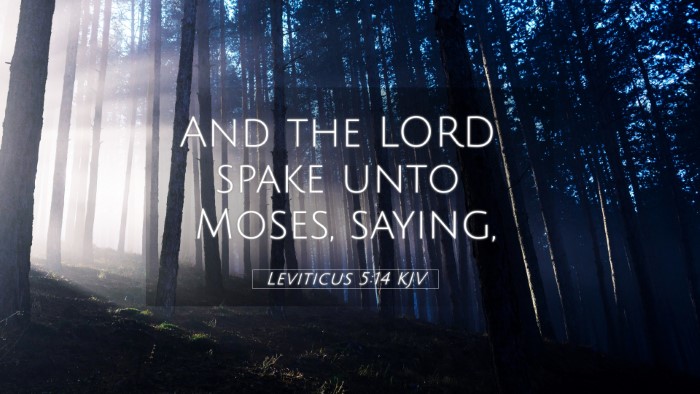Understanding Leviticus 5:14
Verse: "And the LORD spake unto Moses, saying," (Leviticus 5:14, KJV)
Summary of Meaning
The passage provides a divine instruction regarding the trespasses committed unintentionally against the Lord. It highlights the seriousness of sin, even when performed without malicious intent. The chapter as a whole illustrates various forms of sin offerings required in the Old Testament sacrificial system, focusing on the importance of atonement and the need for restoration when one falls short of God's commandments.
Key Insights from Commentaries
The insights below are compiled from several public domain commentaries, including Matthew Henry, Albert Barnes, and Adam Clarke, to provide a deeper understanding of this scripture.
-
Matthew Henry: Henry emphasizes that this verse introduces God's instructions through Moses regarding sin offerings. He notes the grace of God in providing a means of atonement even for unintentional sins. Henry highlights the necessity of acknowledging sin and seeking reconciliation with God.
-
Albert Barnes: Barnes expands on the idea of atonement, indicating that the sacrificial system was established to illustrate the gravity of sin. He points out the relevance of these laws to the children of Israel and their significance in understanding the nature of sin in relation to holiness.
-
Adam Clarke: Clarke discusses the context of the laws concerning offerings and the need for individuals to be mindful of their actions. He asserts that unintentional sins reflect the state of human nature needing divine grace. Clarke draws connections between this verse and the concept of repentance as outlined in the New Testament.
Bible Cross-References
Here are several cross-references that relate to Leviticus 5:14 and its themes:
- Numbers 15:22-29: Addresses sin committed unintentionally and the required offerings.
- Romans 3:23: Highlights all have sinned and fall short of God's glory, emphasizing the need for atonement.
- Hebrews 9:22: States that without the shedding of blood there is no forgiveness of sins, connecting the sacrificial system to New Testament teachings.
- 1 John 1:9: Discusses the importance of confessing sins to receive forgiveness, showing continuity with the themes of reconciliation in Leviticus.
- Matthew 5:23-24: Jesus teaches about the importance of reconciliation and the seriousness of sin, linking personal responsibility to the sacrificial requirements.
- Exodus 30:10: Refers to the annual atonement for the people of Israel, reflecting God’s desire for repentance and purification.
- Psalm 51:17: Indicates that a broken spirit and a contrite heart are what God desires, aligning with the call to acknowledge one’s sins.
Thematic Connections
This verse and its surrounding context reveal several key themes in Scripture, including:
- Sin and Atonement: The need for atonement before God is a recurring theme throughout the Bible, culminating in the sacrifice of Jesus Christ.
- God's Holiness: The emphasis on God's commands illustrates His holiness and the required response from His people.
- Grace and Mercy: Even in the laws concerning sacrifices, God's provision of forgiveness prior to the advent of Christ’s ultimate sacrifice shows His grace and mercy.
Conclusion
Leviticus 5:14 serves as a foundational text in understanding the seriousness of sin, the importance of atonement, and God's holiness. It beckons believers to reflect upon their actions and seek reconciliation with God—all while establishing connections to the greater narrative of redemption found throughout both the Old and New Testaments. By engaging in a Bible cross-reference guide and utilizing tools for Bible cross-referencing, readers can deepen their understanding of these connections and how they relate to their faith journey.
Further Study Suggestions
For those interested in exploring more about the connections between this verse and other biblical texts, consider the following:
- Utilize a Bible concordance to explore related themes across both Testaments.
- Engage in cross-reference Bible study methods to examine the unfolding of sin and grace throughout Scripture.
- Investigate detailed cross-references between Gospels to see how these themes are echoed in the teachings of Jesus.
Understanding Leviticus 5:14 and its implications opens the door to a fuller comprehension of God's redemptive plan, encouraging an exploration of how Old Testament law informs New Testament grace.


